Latin American and Latino Studies celebrates 50 years
Distinguished alumni return for panel discussion, film
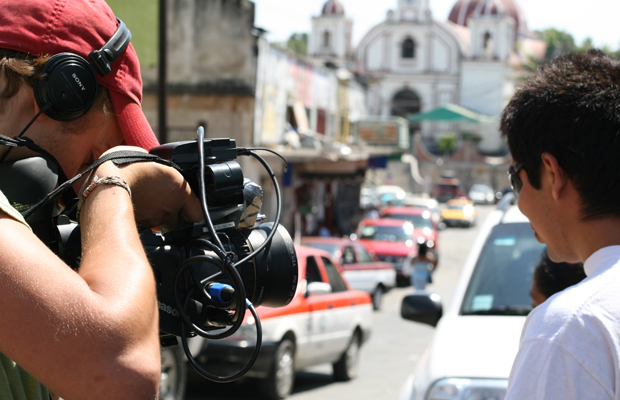
From the film 'Life on Death Beach' by Jeff Arak ’07
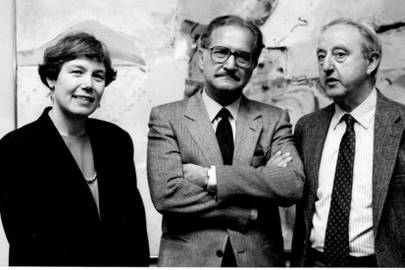
Mexican writer Carlos Fuentes with Jessie Ann Owens (music) and Ricardo Morant (psychology).
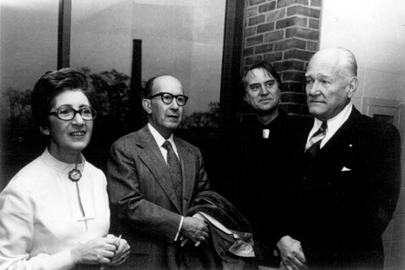
Juan Jose Arevalo, former president of Guatemala, visited campus in 1976. He is seen here with Denah Lida (ROCL), Joseph Criscenti (Boston College), and Donald Hindley (politics) in 1989.
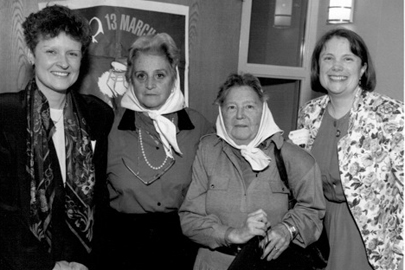
Mothers of the Plaza of the Maya in 1994: Mercedes Colas de Merono and Juana de Pargament with Nidia Schumaher (ROCL) and Mary-Anne Vetterling (Regis College)
In 1963, Brandeis University created its first interdisciplinary program and one of the first Latin American studies programs in the United States.
Fifty years later, the program, now expanded to Latin American and Latino Studies in recognition of the growing Hispanic population in the country, will bring three of its distinguished alumni back to campus to celebrate its history and accomplishments.
Peter Kornbluh ’78, director of the National Security Archive’s Chile Documentation and Cuba Documentation projects; Frances Hagopian ’75, the Lemann Visiting Associate Professor for Brazil Studies at the Department of Government at Harvard and faculty chair of the Brazil Studies Program of the David Rockefeller Center for Latin American Studies; and Jeff Arak ’07, a documentary filmmaker whose latest film, “Life on Death Beach,” focuses on a group of volunteer lifeguards in a town on the coast of Oaxaca, Mexico, will speak about their experiences at the event on March 13, at 4:30 p.m., in the Shapiro Admissions Center conference room. A screening of Arak’s film will be held in the Wasserman Cinemateque on March 14, at 7 p.m.
“I'm so impressed by [former Brandeis President] Abe Sachar's vision in founding the program 50 years ago, in the faculty for its excellence and ambition, and thankful to our donors for helping us revive and strengthen this gem of a program that makes Brandeis so special,” says Silvia Arrom, history professor and Jane’s Professor of Latin American Studies, named for a student who passed away. “It makes me proud to have been part of this distinguished enterprise.”
The program offers both a major and minor, and draws on faculty in nine departments in the School of Arts and Sciences, the Heller School for Social Policy and Management and the International Business School. Majors are required to take at least nine courses in the program, no more than four in the same department, ensuring its interdisciplinary breadth.
Students are encouraged both to get involved in the local Latino community, and to travel abroad to Latin American countries.
Professors like Arrom and Fernando Rosenberg, associate professor of Romance studies and comparative literature and chair of the Latin American and Latino Studies Department, help them do that. Arrom taught a course in which students conducted interviews with Latino leaders in Waltham and produced a brochure on the history of Latinos in the area. Students in one of Rosenberg's courses worked with the Waltham Public Library, where they helped local Latino residents tell their stories.
 |
| Peter Kornbluh '78 |
“While Brandeis now offers 25 interdepartmental programs, some offering majors, some minors, and some both, Latin American (and now Latino) Studies was the pioneering first,” says Elaine Wong, senior associate dean of arts and sciences. “As in other interdisciplinary programs, faculty from different departments bonded together around a common intellectual and academic interest shared by our undergraduates. Interdepartmental programs now offer the Brandeis minors which enroll the greatest number of students, and two of the top five majors in terms of enrollment. But more importantly, they exemplify the interdisciplinary strength of our curriculum and the research interests of our faculty.”
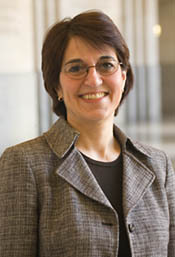 |
| Frances Hagopian '75 (Photo/Harvard University) |
LALS also offers students Jane’s Travel Grants for students who want to conduct research in Latin America, the Caribbean and the Latin American diaspora in the U.S., with grants varying depending on airfare, the length of the trip and project budget.
“Half a century is a long time; it’s a real milestone,” Arrom says of the anniversary and continued health of the program. “For such a small university, such a new university, to have been able to do so much is amazing and should be celebrated.”
Even early on, the program was able to bring such prominent visitors to campus as authors Jorge Luis Borges of Argentina and Carlos Fuentes of Mexico, as well as former presidents of Costa Rica and Guatemala, Pepe Figueres and Juan Jose Arevalo, respectively.
This time around, the notable speakers are the program’s own alumni.
“Peter has been using the Freedom of Information Act to find out what our government has been doing in Latin America. He began doing that work with a senior essay he wrote here – he wanted to investigate what the U.S. role was in the Chilean coup,” Arrom says. “Jeff was a student filmmaker we supported with a Jane’s Travel Grant. A number of our alumni have gone on to have distinguished careers in the field.”
Categories: Alumni, Arts, Humanities and Social Sciences, International Affairs





